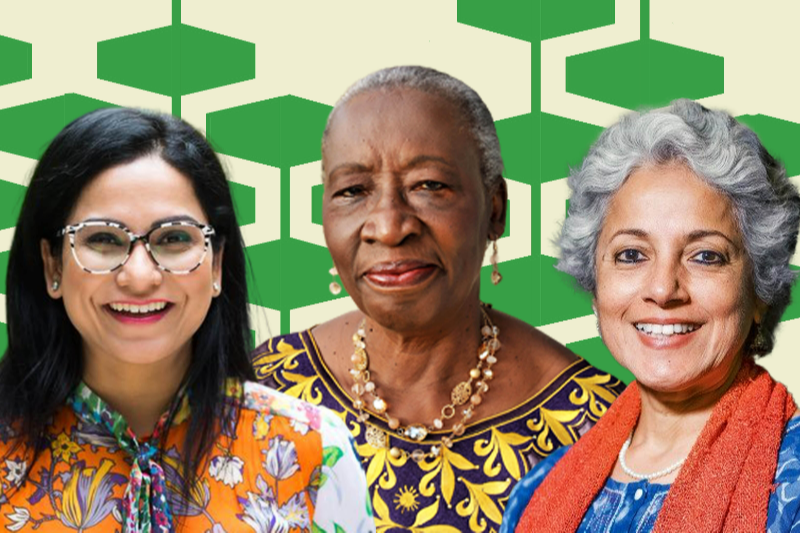
Women in science
TDR is supporting pilot schemes to enhance career opportunities for women scientists in infectious diseases. Globally, recent data from UNESCO indicates that only 28% of researchers employed in research and development (R&D) are women. Major gender disparities between women and men research scientists are also evident in places of work and in their levels of responsibility. Women scientists primarily work in academic and government institutions, while their male counterparts are engaged more in the private sector, where they enjoy better pay and opportunities. In addition, women scientists are often concentrated in the lower echelons of responsibility and decision-making with limited leadership opportunities.
In the area of infectious diseases of poverty, the dearth of women scientists often means a lack of diverse perspectives essential to addressing gender dimensions and the burden of infectious diseases, which often disproportionately affect women. Moreover, with few women occupying decision-making positions in academic and research institutions, their scientific role in prioritizing research agendas is severely circumscribed. This leads potentially to adverse implications for addressing and eliminating infectious diseases.
Improving the careers of women scientists in Africa
Academic and research institutions in 9 countries in Sub-Saharan Africa (Cameroon, Congo, Ethiopia, Guinea, Kenya, Malawi, Mali, Nigeria, Uganda) received TDR funding to implement a variety of concepts and strategies aimed at addressing barriers that early-career women scientists face. Activities include mentoring, manuscript and proposal development, research methodology and ethics skills building. It also includes the development of professional networks at various levels, notably at the national level in Cameroon and Malawi, across institutions in Mali and inter-regionally in Central Africa.
Career Development for Women in Science in Africa projects
Cameroon – University of Yaoundé
Higher Institute for Growth in Health Research for Women Researchers (HIGHER Women) established a national network, a structured mentor/protégé program, and provided grant writing and proposal development skills to early-career women scientists in Cameroon.
Profile of Rose Leke, the manager of this project
Congo - Fondation Congolaise pour la Recherche Médicale, Université Marien Ngouabi, Brazzaville
‘Making Health Research A Passion for Women’ project developed a platform for exchange and support and conducted gender analysis through an inter-regional network - Central Africa Network on Tuberculosis, HIV/AIDS and Malaria (CANTAM).
Ethiopia - Addis Ababa University
The project at Addis Ababa University provided support to the Society for Ethiopian Women in Science and Technology (SEWIST) through capacity-building workshop and mentorship.
Guinea - Service de Pneumophtisiologie, Hôpital National Ignace Deen, Conakry
Guinea’s Project DARE strengthened the capacity of 12 women scientists in research protocol development and research methodology and ethics, and facilitated the development of a peer-to-peer mentoring network.
Kenya - Center for Global Health Research, Kenya Medical Research Institute, Kisumu
KEMRI led a capacity-building workshop and provided mentorship to 20 female final-year biomedical science students from five public universities in western Kenya.
Profile of Elizabeth Akinyi Ochola, the manager of this project
Malawi - University of Malawi, College of Medicine
Malawi’s project established a national network – Women in Infectious Diseases Research in Malawi (WIDREM), a mentoring and career development programme at University of Malawi’s College of Medicine, and held a workshop that provided personal development and mentoring skills to 40 women scientists.
Mali - National Malaria Control Programme (PNLP) and Université du Mali
Mali’s National Malaria Control Programme (PNLP) established an inter-institutional network (RIARF) comprising of 16 health research institutions in Mali to support women scientists to advance their careers. A capacity-building programme to support women scientists was developed.
Nigeria - Federal University Lokoja
The project led a series of capacity building workshops on proposal development, scientific writing and mentorship courses. The team also facilitated structured mentorship for 26 women scientists drawn from seven universities in four regional settings in Nigeria.
Uganda – Makerere University
Women Scientists’ Career Development Programme (WoSCaDeP): A career development programme led a capacity building workshop and provided mentoring and grant writing and proposal development skills to women scientists at Makerere University College of Health Sciences.
Profile of Dr Pauline Byakika, the manager of this project
TDR Global profiles
Featured publications
Women in science
For 50 years, TDR has been fighting infectious diseases of poverty, engaging researchers and experts from all over the world in its efforts. Each...

Global Health Matters podcast: Women in science
Related links
More about TDR's gender and infectious disease research
TDR Global profiles
includes women from this gender grant programme
"When she rises, we all rise"
Read about the impact of the crowdsourcing challenge
Association for Women in Science
European Platform for Women Scientists
Organization for Women in Science for the Developing World
The Association of Academies and Societies of Sciences in Asia
Women in Global Science and Technology
L’Oreal UNESCO Award for Women in Science
WHO gender, equity and human rights topic page
World Economic Forum on gender and science
Efforts within the UN system to promote women’s participation and leadership in science
UN Commission on Science and Technology for Development (UNCSTD)’s Gender Advisory Board conducts research and advises national governments and the UN system on gender dimensions of Science and Technology (S&T) policy.
UNESCO‘s Major Programme (MP) sets standards in support of the global science agenda which ensures the unique perspectives of women scientists and women knowledge holders.
UN Women actively promotes women’s participation and leadership in information and communications and technologies (ICTs) and science, technology, engineering and mathematics (STEM).
WHO has a gender mainstreaming policy that was adopted in 2007 by the 60th World Health Assembly (WHA), which passed resolution WHA60.25 on integrating gender analysis and actions into the work of the organization. In addition, WHO is implementing a Roadmap for action for 2014-2019, on integrating equity, gender, human rights and social determinants into the work of the Organization.

